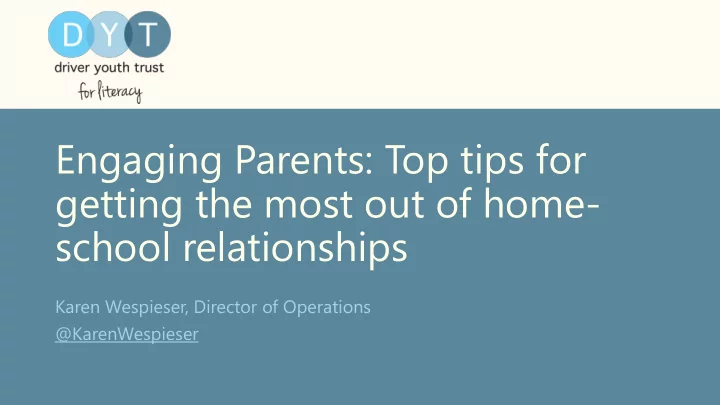

Engaging Parents: Top tips for getting the most out of home- school relationships Karen Wespieser, Director of Operations @KarenWespieser
Introductions
EEF Toolkit • Moderate impact Although parental engagement is consistently associated with pupils’ • Moderate cost success at school, the evidence about • Moderate evidence how to improve attainment by increasing parental engagement is mixed and much less conclusive, particularly for disadvantaged families.
Parentkind Blueprint 1. Leadership, ethos and resources 2. Effective two-way communication 3. Parents supporting learning 4. Parent involvement in school life 5. Community engagement
DYT Top tips for schools communicating with parents Parents play a crucial role in supporting their children’s learning, and levels of parental engagement are consistently associated with children’s academic outcomes. This is never truer than when a child is struggling with an aspect of school, the curriculum or their learning. Here are our expert top ten communication tips for SCHOOLS...
1. Be honest To achieve the best outcome for the learner you will need a level of partnership with their parents. If you gloss over your concerns or say everything is fine when it’s not then this partnership will fail.
2. Be timely If you have a concern don’t wait until parents evening to address it. Contact the parent at the first opportunity.
3. Make it easy to communicate Ensure that all communications are accessible How easy is it to navigate your website or to get past the receptionist to contact you on the phone? Avoid confusing jargon, abbreviations and acronyms wherever possible Be aware of reading levels of written text, e.g. dyslexia is often hereditary
4. Ask for help Actively seek parents’ expertise and ask them what works, what they are doing at home and how you can reinforce this at school.
5. Listen Listen to a parent’s perspective without being dismissive, their insight and/or concerns could help in creating support strategies.
6. Who's got the power? Consider the power-relations when meeting face-to-face. Ask parents how they would like to be addressed and stick to it, if in doubt use their surname.
7. Structure your conversation Consider using a structured conversation, for example, a meeting notes template which begins by looking at what is working well and subsequently what areas could be improved.
8. Encourage parents Encourage parents to offer a balanced degree of support for homework. Make it clear how much time you expect to be spent on school-work at home and ask parents to indicate times in the margin of homework rather than asking them to ensure a task is completed.
9. Share with parents Provide parents with detailed information of particular approaches and appropriate resources which can be used to support home learning.
10. Value parents Try to make a specific suggestion about how you would like to see your concern resolved. Going into a discussion with a constructive suggestion rather than a complaint can be helpful.
Thank you for listening! Contact me: Karen.Wespieser@driveryouthtrust @KarenWespieser www.DriverYouthTrust.com
TOP TIPS FOR PARENTS COMMUNICATING WITH SCHOOLS Parents play a crucial role in supporting their children’s learning, and levels of parental engagement are consistently associated with children’s academic outcomes. This is never truer than when a child is struggling with an aspect of school, the curriculum or their learning. Here are our expert top ten communication tips for PARENTS...
1. Start with the teacher The class teacher (in primary) or form tutor (in secondary) should always be your first port of call as they have the closest relationship with your child.
2. Communication is key Figure out how best to communicate. Whether over the phone, via email or letter. Make sure you have some face- to-face interaction too… a quick chat can often solve a lot more than a long email chain!
3. Understanding the graduated approach The class teacher is responsible for making adjustments via the graduated approach before any additional support or intervention is put in place. The graduated approach is a four-part cycle where plans for the learner are assessed, then planned. Following the plan being put in place (do) they are reviewed and, if necessary, changed (and so the cycle continues).
4. Ask (LOTS) of questions… There’s no such thing as a silly question! How? When? Where? What? Why?
5. ...But give lots of answers too Help the school to support your child’s learning by providing teachers with information on how you support your child at home. Feel confident in sharing and asking for support to reinforce your strategies to ensure consistent approaches.
If you need to raise a concern…
6. SENCOs Arrange a meeting with the Special Educational Needs Coordinator (SENCO) or Head of Learning Support. If possible, try to include the class teacher or form tutor in these discussions too
7. Schools have policies to help in these situations Help the school to support your child’s learning by providing teachers with information on how you support your child at home. Feel confident in sharing and asking for support to reinforce your strategies to ensure consistent approaches.
8. Communication (again) Consider whether the communication method is commensurate to the concern. Is this a small thing where a short conversation in the playground will suffice or do you need to keep a record of the correspondence?
9. Don't wait Raise concerns quickly – waiting risks embedding a problem and may make it harder to resolve.
10. Know what you want Try to make a specific suggestion about how you would like to see your concern resolved. Going into a discussion with a constructive suggestion rather than a complaint can be helpful.
Thank you for listening! Contact me: Karen.Wespieser@driveryouthtrust @KarenWespieser www.DriverYouthTrust.com
Recommend
More recommend